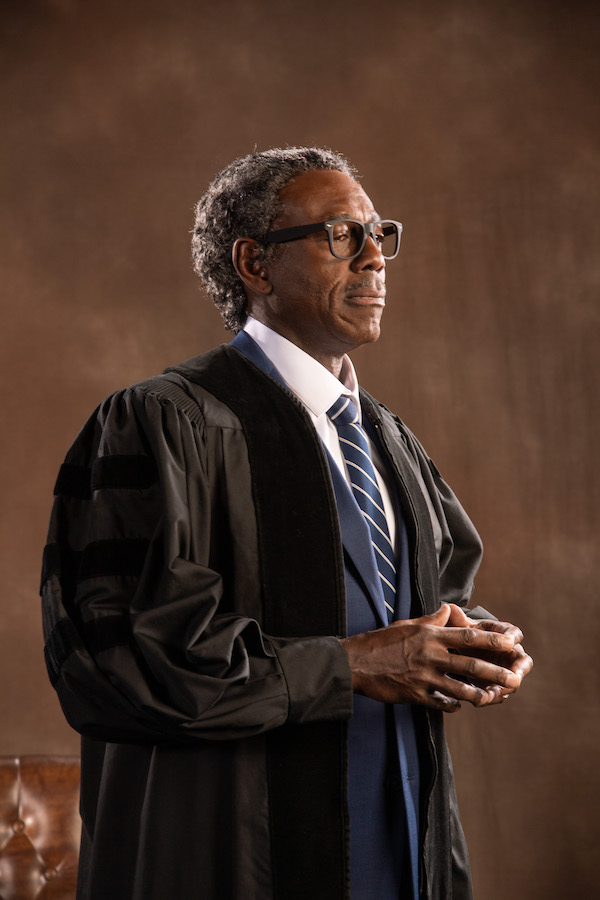Utah Shakespeare Festival opens fall with absorbing “Thurgood”

Derek Charles Livingston introduced himself to Utah Shakespeare Festival audiences Wednesday onstage in the persona of Thurgood Marshall, the pioneering civil-rights attorney, Supreme Court justice, and subject of George Stevens Jr.’s 2006 play Thurgood. Livingston’s captivating portrayal of the multifaceted Marshall—erudite, impassioned, mischievous—made for an auspicious introduction.
The production took on added interest in June when Livingston, the festival’s director of new play development, was appointed as the company’s interim artistic director after Brian Vaughn’s abrupt departure.
The opening of the one-act, one-actor play also marks the festival’s transition from summer to fall, after open-air productions of All’s Well That Ends Well, King Lear and Sweeney Todd and the indoor production of Trouble in Mind closed. (The Tempest, The Sound of Music and Clue continue in repertory with Thurgood on the festival’s indoor stages.)
Playwright George Stevens Jr.’s framing device—an imagined 1991 lecture at Marshall’s alma mater, Howard University Law School—proves to be a flimsy pretext for the show, but no matter. From the moment the venerable jurist sets down his cane, he is not just retelling but reliving decades of racial injustice as well as his landmark legal victories. Over the course of ninety fast-moving minutes, Livingston, as Marshall, exults as he re-creates his winning arguments, adopts a grandfatherly air as he gives his candid impressions of historic figures such as Douglas MacArthur and Dwight D. Eisenhower, and seethes at the memory of racial insults and slights (and be forewarned, he is frank about the slurs he endured).
The story begins with a bit of Marshall family history, including a great-grandfather who was so cantankerous that his enslaver set him free. As with a few other ostensibly comedic anecdotes during the evening, Livingston tells the tale with an arched brow and just enough of an edge to remind viewers that slavery was no laughing matter. A short history lesson on the Supreme Court’s infamous 1896 Plessy v. Ferguson ruling, which upheld the “separate but equal” doctrine Marshall became instrumental in overturning, lays the groundwork for a highly persuasive explanation of his legal philosophy.
In addition to Marshall, Livingston portrays several supporting characters—including his two wives, opposing legal counsel, a racist senator who remains nameless, and President Lyndon Baines Johnson—bringing all to life through changes of inflection and body language. Delicia Turner Sonnenberg’s seamless direction and Chandler Oppenheimer’s projections of historic photos further illuminate the story.
The audience in the cozy Aileen and Allen Anes Studio Theater was engaged throughout Wednesday’s performance. Playgoers called out the name of Plessy v. Ferguson on a cue from Livingston, murmured approvingly as the actor reconstructed Marshall’s arguments before the Supreme Court, and gasped at the revelation that Justice Hugo Black, who administered the oath to Marshall when the latter joined the high court, had been a member of the Ku Klux Klan.
That last historical tidbit is one of a handful of facts and insights that might surprise even those familiar with Marshall’s story. Those less familiar will come away from Thurgood with a better understanding of this notable American as well as the thoughtful actor who will continue bringing new stories to the long-running festival.
Thurgood plays through October 8 at the Utah Shakespeare Festival in Cedar City; bard.org